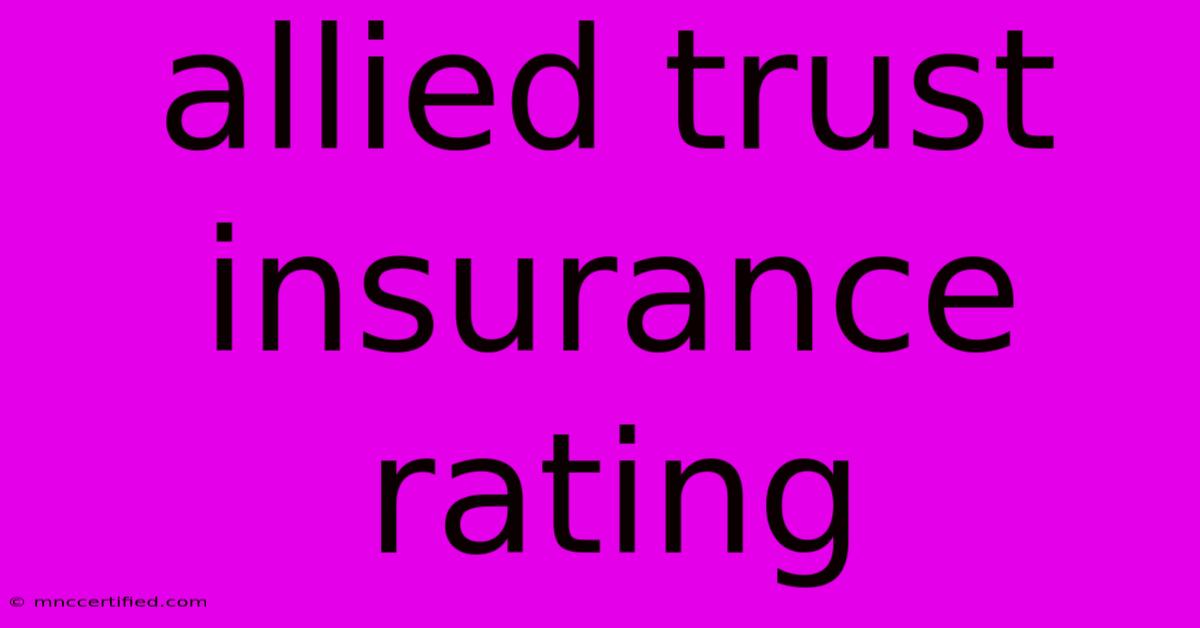Allied Trust Insurance Rating

Table of Contents
Allied Trust Insurance Rating: A Comprehensive Guide
Choosing the right insurance provider is a crucial decision, impacting your financial security and peace of mind. Understanding an insurer's financial strength and stability is paramount. This comprehensive guide delves into Allied Trust Insurance's rating, exploring how these ratings are determined and what they mean for potential customers. We'll also touch on comparing Allied Trust to other insurers and finding the best fit for your needs.
Understanding Insurance Company Ratings
Insurance company ratings are crucial indicators of financial stability and the likelihood of an insurer fulfilling its policy obligations. Reputable rating agencies, such as A.M. Best, Moody's, Standard & Poor's (S&P), and Fitch, analyze insurers' financial health using various factors. These factors include:
- Loss Reserves: The amount of money set aside to cover future claims. Adequate reserves are critical for a strong rating.
- Underwriting Performance: How effectively the insurer assesses and manages risk. Consistent profitability in underwriting demonstrates strong risk management.
- Investment Portfolio: The quality and diversification of the insurer's investments significantly impact its financial strength.
- Capitalization: The amount of capital the insurer holds as a buffer against unexpected losses. Higher capitalization generally indicates greater financial strength.
- Management Quality: The competence and experience of the insurer's management team play a vital role in its long-term success.
Each rating agency uses its own proprietary methodology, leading to slight variations in ratings. However, the general principles remain consistent. Higher ratings generally reflect greater financial strength and stability.
Finding Allied Trust Insurance's Rating
To find Allied Trust Insurance's rating, you should consult the websites of the major rating agencies mentioned above (A.M. Best, Moody's, S&P, and Fitch). Search for Allied Trust on their respective sites. Remember that the rating may vary slightly depending on the specific agency and the type of insurance (auto, home, etc.) being assessed. Always check the date of the rating, as ratings can change over time.
Important Note: The absence of a rating from a major agency doesn't automatically mean a company is unreliable. Smaller or newer companies might not yet be rated by these agencies. However, it's always advisable to prioritize insurers with established ratings from reputable sources.
What the Rating Means for You
A strong Allied Trust Insurance rating (if available and positive) signifies:
- Greater Financial Security: A higher rating suggests a lower risk of the company failing to pay claims.
- Increased Confidence: Knowing the insurer is financially sound can provide peace of mind.
- Potential for Long-Term Stability: A well-rated company is more likely to be around to honor your policy in the future.
However, a low or negative rating (if applicable) might indicate:
- Higher Risk of Claim Denial: A financially unstable company might be more likely to deny or delay claims.
- Increased Uncertainty: The future of the company and your coverage could be uncertain.
Comparing Allied Trust to Other Insurers
Once you've determined Allied Trust's rating, it's crucial to compare it to other insurers offering similar coverage. Consider not only the rating but also:
- Price: Compare premiums for comparable coverage.
- Coverage Options: Assess the breadth and depth of the coverage offered.
- Customer Service: Read online reviews and check customer satisfaction ratings.
- Policy Features: Look for additional features or benefits offered by different insurers.
By comparing Allied Trust with other reputable insurers, you can make an informed decision that best suits your needs and budget.
Conclusion: Making an Informed Decision
Understanding Allied Trust Insurance's rating is a critical step in choosing an insurance provider. Remember to consult multiple rating agencies, compare ratings with other insurers, and consider factors beyond the rating to make a well-informed decision. Prioritize your financial security and choose a provider that offers both strong financial stability and reliable customer service. Your insurance needs are unique, so selecting the right provider requires careful research and comparison.

Thank you for visiting our website wich cover about Allied Trust Insurance Rating. We hope the information provided has been useful to you. Feel free to contact us if you have any questions or need further assistance. See you next time and dont miss to bookmark.
Featured Posts
-
Live Score Manchester United Vs Bodo Glimt
Nov 29, 2024
-
Lions Game Brown Montgomery In
Nov 29, 2024
-
Chiefs Add Humphries Pacheco
Nov 29, 2024
-
Khalife The Mi 5 Escape Story
Nov 29, 2024
-
Cold Weather Payment Full List Of Eligible Areas
Nov 29, 2024